人教部编版初中九年级英语Unit1-3全部知识点总结
- 格式:pdf
- 大小:16.36 MB
- 文档页数:12
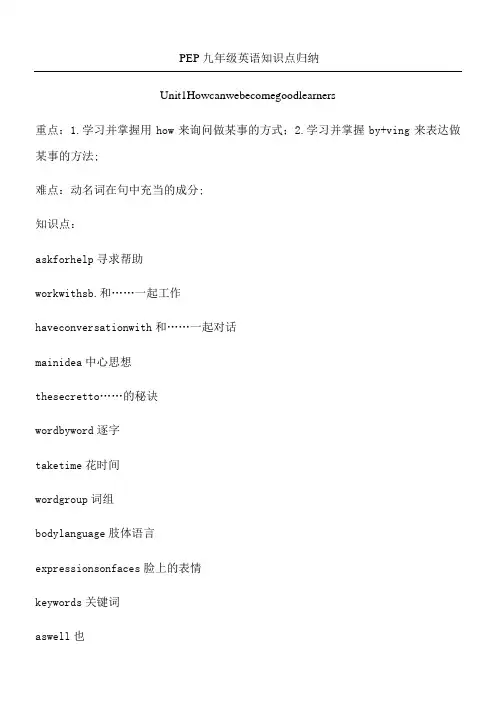
PEP九年级英语知识点归纳Unit1Howcanwebecomegoodlearners重点:1.学习并掌握用how来询问做某事的方式;2.学习并掌握by+ving来表达做某事的方法;难点:动名词在句中充当的成分;知识点:askforhelp寻求帮助workwithsb.和……一起工作haveconversationwith和……一起对话mainidea中心思想thesecretto……的秘诀wordbyword逐字taketime花时间wordgroup词组bodylanguage肢体语言expressionsonfaces脸上的表情keywords关键词aswell也lookup查看takenotes记笔记practicedoingsth.练习做某事penpal笔友keepadiary记日记makemistakes犯错increase增加;提高decrease减少;降低practicewithsb.和……一起练习dependon依赖whetherornot是否payattentiontosth./doingsth.注意某事/做某事foralongtime很长一段时间connect…with…把……和……连接起来writedown写下mindmap思维导图lifelongjourney终身的旅程onone’sown独自地bitbybit一点点atonce马上,立刻It’sapieceofcake.小菜一碟;Itservesyouright.你活该;Useitorloseit.Practicemakesperfect.Unit2Ithinkthatmooncakesaredelicious重点&难点:1.that,ifwhether引导的宾语从句;2.感叹句的学习和运用;知识点:DragonBoatFestival端午节SpringFestival春节LanternFestival元宵节eatout吃光puton增肥endup最终成为washawaybadthings洗去灾祸goodluck好运intheshapeof以……的形式traditionalfolkstories传统民间故事shotdown击落,打垮flyupto飞向callout one’sname喊出某人的名字layout展示,安排share…withsb.和某人分享……Itisagoodideatodosth.做某事是个好主意do…instead做某事来代替playatrickon开……的玩笑dressup打扮hauntedhouse鬼屋thinkof思考,考虑warnsb,todosth.警告某人做某事remindsb.ofsth.使某人想起某事promisetodosth.承诺做某事inneed有需要treatsb.withsth.用……招待某人givebirthto产生,造成,生孩子notonly…butalso…不仅……而且……justlike就像,正如感叹句:What+a/an+adj.+名词+主语+谓语+其他How+adj./adv.+主语+谓语+其他Unit3Couldyoupleasetellmewheretherestroomare重点:学习并掌握wh-&how所引导的宾语从句;难点:运用宾语从句礼貌地寻求帮助;知识点:excuseme打扰了goalong进行,支持beside在……旁边besides除此之外turnleft/right左/右转gopast经过startwith由……开始holdone’shand拉某人的手do+动词原形表强调直陈式语句atthattime在那个时候pardonme对不起;请再说一遍mailaletter寄一封信suggestsb.shoulddosth.建议某人做某事Thatisbecause那是因为leadinto导入ontime准时Iwouldlikethankyoufor…I’mlookingforwardtoyoureply.Unit4Iusedtobeafraidofthedark.重点&难点:1.学习并掌握usedtodo句型;2.学会用usedtodo句型描述自己或他人过去常常做的事情;知识点:usedtodo过去常常做adj.+enough足够……的fromtimetotime时常,有时sucha多么do动词原形seesb.doing正在进行getgoodscoresonexams在测试中取得好成绩wearglasses戴眼镜takeupsth.开始做某事daretodosth.敢于做某事tonsofattention很多关注privatetime私人时间theroadtosuccess成功之路fighton继续斗争makeittothetop成就大事业curlyhair卷发abookon+内容一本关于……的书dowellin=begoodat擅长于beabsentfrom缺席……boardingschool寄宿学校inperson亲自advisesb.todosth.建议某人做某事takepridein=beproudof为……感到自豪self-introduction自我介绍Unit5Whataretheshirtsmadeof重点:1.学习并掌握被动语态的用法和句子结构;2.用英语描述和询问物品的制作材料;难点:被动语态的用法和句子结构的理解和运用;知识点:bemadeof由……制成可看出原材料bemadefrom由……制成不可看出原材料bemadein在……制作beknownfor以……闻名asfarasIknow正如我所知nomatter无论nomatterhow=howevernomatterwhat=whatevernomatterwhen=whenevernomatterwhe re=whereversb.findit形式宾语+adj.+todosth./that从句avoiddoingsth.避免做某事high-technologyproduct高科技产品trafficaccident交通事故turn…into…把……转变为……sendout放出introuble困境中riseinto上升,上涨hot-airballoons热气球skylanterns孔明灯papercutting剪纸beshapedby由……塑造becoveredwith由……覆盖atmidnight在午夜Unit6Whenwasitinvented重点:1.学习并掌握被动语态的一般过去时态;2.学会询问发明时间和用途;难点:运用被动语态的一般过去时态来讨论发明时间和用途;知识点:I t’smypleasure.=Mypleasure.我的荣幸;haveapoint有道理byaccident偶然地Itissaidthat据说Itisbelievedthat人们相信openfire篝火remainforsometime保留一段时间takeplace发生withoutdoubt不疑有他dropinto落入advisesb.nottodosth.建议某人不要做某事besimilarto与……相似inhistory在历史上divide…into…把……分成……atthesametime与此同时stopsb.fromdoingsth.阻止某人做某事dreamofdoingsth.梦想做某事notonly…butalso…不仅……而且……lookuptosb.敬佩某人achievedreams实现梦想Don'tmentionit.不客气,不用谢translate...into....把…翻译成…Unit7Teenagersshouldbeallowedtochoosetheirownclothes.重点:被动语态的学习和运用;难点;should+be+pp.+todosth.这一结构的学习和运用知识点:driver’slicense驾驶证Noway没门Idon’tthinkthat…part-timejob兼职getone’searspierced打耳洞get/have/makesth.done使某物被……spendtimewithsb.花时间和某人在一起schooltrip学校组织的旅行allowsb.nottodosth.singtosb.对某人唱歌by one’sside在某人身边runthrough穿越givesb.ahug给某人一个拥抱liftsb.up举起某人talkback回嘴awfuldream噩梦by+时间点到……为止,在……之前belatefor迟到regretdoingsth.后悔做某事keepsb.awayfromsth.使某人远离某物givesb.achancetodosth.给某人一个机会做某事moveout搬出去taketest参加考试passtest通过考试failtest没通过考试getinthewayof妨碍……havenothingagainstwithsth./doingsth.不反对某事/做某事endupwith以…结束endupas最终成为beseriousaboutsth.认真对待某事makeachoice做选择Unit8ItmustbelongtoCarla.重点:1.学习并掌握情态动词must,might,can’t,could表推测;2.学会描述表示物品所属的问答;难点:学习并掌握情态动词must,might,can’t,could表推测;知识点:belongto属于atthepicnic在野餐时attendaconcert参加音乐会inthemusichall在音乐厅gotoapicnic去野餐picksth.up捡起nothingmuch没什么runaway逃走intheneighborhood在社区havenoidea=don’tknow不知道noise-maker噪音制造者makenoise制造噪音catchabus赶公交wearasuit穿套装onthelongestdayoftheyear在一年最长的那天pointout指出inacertainway以某种确定的方式moveup上升aburialplace墓地honorancestor祭拜祖先agroupof一组……perhaps也许shinedirectlyinto…直接照进……rockmusic摇滚乐atwork上班runningshoes跑鞋表推测语气从强到弱:must,may,might,could一般用于疑问句或否定句Unit9IlikemusicthatIcandanceto.重点&难点:学习并掌握关系代词that/who引导的定语从句;知识点:dancetomusic随着音乐跳舞singalongwith随着……一起唱preferAtoB比起B更喜欢ApreferdoingAtodoingBprefertodosth.ratherthandosth.electronicmusic电子音乐besupposedtodosth.应该做某事supposesb.todosth.猜想某人做某事sparetime空闲时间inone’ssparetime在某人空闲的时候sparetimetodosth.抽空做某事smoothmusic悦耳的音乐inthatcase既然那样WorldWarⅡ二战feellikedoingsth.想要做某事stickto坚持cheersb.up使某人振奋起来tryone’sbest尽某人最大能力solveproblems解决问题agoodwaytodosth.做某事的好方法plentyof大量Spider-Man蜘蛛侠intime及时shutoff关闭folkmusic民俗乐piecesofmusic几首曲子bebornin出生在……byage17到17岁的时候beknownfor因……而出名continuetodosth.继续做某事bytheendof到……为止Itisapitythat遗憾的是recallsb.fromsth.从……召回某人的记忆intotal总共touchthehearts触动心灵forthisreason出于这个原因Unit10You’resupposedtoshakehands.重点:学习并掌握besupposedto,beexpectedto和beimportantto的用法;难点:培养学生跨文化交流意识;知识点:besupposedtodosth.应该做某事beexpectedtodosth.应该/被期望做某事beimportanttodosth.做某事是重要的shakehands握手bowtosb.向某人鞠躬holdoutone’shand伸出某人的手greeteachother互相问候onbothsideofmyface在我的两颊上berelaxabout对……放松rusharound东奔西跑valuethetime珍惜时间walkaround四处走动asmanyassb.can=asmanyaspossible尽可能多的makeanefforttodosth.努力做某事keepsb.waiting让某人一直等候It’snobigdeal没什么大不了的goabroad出国athome在国内clean…off把……擦掉takeoff脱下;起飞beworthdoingsth.值得做某事tablemanner餐桌礼仪stick…into…把……插进……gooutofone’swaytodosth.特地做某事…,格外努力做…makesb.feelathome使某人感到宾至如归becomfortabledoingsth.轻松地做某事cutitup把它切开begraduallydoingsth.逐渐做某事gooutofone’sway特地,不怕麻烦showup出席,露面Bestwishes.祝好运;Unit11Sadmoviesmakemecry.重点&难点:学习并掌握make+sb.+v.原形/adj.的结构和用法;知识点:wouldratherdo宁愿做某事wouldratherdosth.thandosth.宁愿做某事而不做某事quietmusic轻音乐havefunwithsb.和某人一起度过愉快时光gettoknow了解,认识joinsb.加入某人,与某人结伴eachtime每次leftout忽视alongtimeago很久以前paleaschalk像粉笔一样苍白cryfor因……而哭callin召集neither…nor…不……也不……takeone’sposition取代某人的位置handback交回throwrubbish扔垃圾returnto返回keepone’seyesontheground一直盯着地板看onone’sshoulder在某人肩膀上kicksb.off把某人踢掉missdoingsth.错过做某事knockondoor敲门behardonsb.对某人苛刻pulltogether齐心协力nodinagreement点头同意offeradvice提建议Unit12Lifeisfulloftheunexpected.重点&难点:学习并掌握过去完成时;知识点:bythetime到……时候getintheshower在淋浴gooff闹钟响rushoutof奔出brushone’steeth刷牙givealift让……搭车beabouttodo即将做某事eastfrom在……的东边waitinline排队等候indisbelief难以置信的jumpoutof跳出takeoff起飞hearabout听说turninto变成bytheendof到……为止acostumeparty一个化装舞会takeplace发生playtrick/jokeonsb.开某人玩笑AprilFool’sDaybesoldout卖光loseweight减肥endupdoingsth.以……结束landon着陆moveacross跨越spreadacross传遍,席卷as+doingturnaround转身goinside进去handin上交Unit13We’retryingtosavetheearth复习课重点&难点:现在进行时、usedtodo句型、被动语态、现在完成时和情态动词的复习和巩固;知识点:noisepollution噪音污染airpollution空气污染waterpollution水污染thebottomof……的底部throw…into…把……扔进……playapartindoingsth.在……中起作用cutdown砍到takethebus=bybuswastepollution垃圾污染takeawayfood外卖食品makeadifference有影响hearof听说sharkfin鱼翅cutoff切下nolonger不再atthetopof在……顶端foodchain食物链fallbyover90percent下降超过90%inthelast…ys在过去的……年里sofar迄今为止begoodfor对……有好处ocean’secosystem海洋生态系统Clean-UpDay清洁日affordto有条件做某事takeaction采取行动turnoff关闭payfor购买……insteadof取代papernapkins餐巾纸puttogooduse施展build…outof用……建造……pulldown摧毁;推翻upsidedown颠倒winaprize获奖setup建立setupwebsite建立一个网站setupabusiness开业Notonlycan…,butitalso…半倒装句Unit14IremembermeetingallofyouinGrade7.复习课重点&难点:利用所学知识描述过去事件;知识点:rememberdoingsth.记得做过某事dosurvey做调查helpsb.withsth.帮助某人某事scoretwogoals踢进两个球inarow连续takeabreakfromdoingsth.暂时停止做某事teachingmethods教学方法bepatientwith对……耐心workout解决guidesb.todosth.引导某人做某事taketimetodosth.花费时间做某事putinmoreeffort投入更多努力lookback回看keepone’scool保持冷静trainfor为……训练bebetteratsth. haveproblemswith有……问题theendoftheyear年底firstofall首先thirstyofknowledge渴望知识noneof三个或三个以上都不meantosb.对某人重要failtodosth.未能做某事aheadof在……之前alongtheway沿路learnfromalongwith与……一道inafewyears’time几年后onjourney旅途中separatefrom分离beresponsiblefor对……负责。
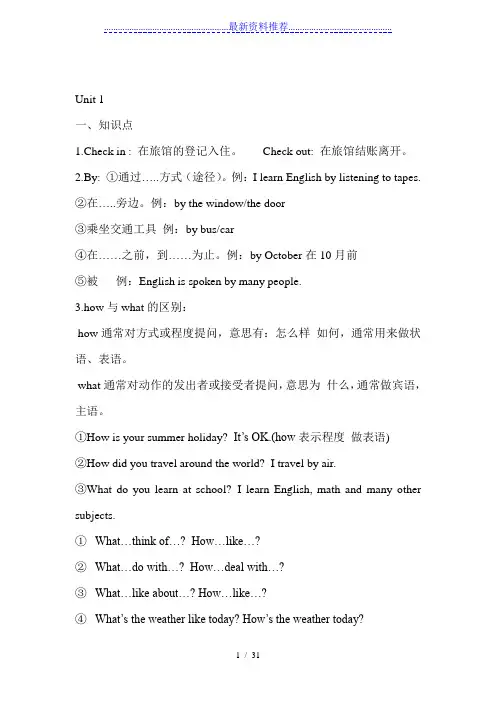
Unit 1一、知识点1.Check in : 在旅馆的登记入住。
Check out: 在旅馆结账离开。
2.By: ①通过…..方式(途径)。
例:I learn English by listening to tapes.②在…..旁边。
例:by the window/the door③乘坐交通工具例:by bus/car④在……之前,到……为止。
例:by October在10月前⑤被例:English is spoken by many people.3.how与what的区别:how通常对方式或程度提问,意思有:怎么样如何,通常用来做状语、表语。
what通常对动作的发出者或接受者提问,意思为什么,通常做宾语,主语。
①How is your summer holiday? It’s OK.(how表示程度做表语)②How did you travel around the world? I travel by air.③What do you learn at school? I learn English, math and many other subjects.①What…think of…?How…like…?②What…do with…?How…deal with…?③What…like about…? How…like…?④What’s the weather like today? How’s the weather today?⑤ What to do? How to do it?e.g. What do you think of this book?=How do you like this book?I don’t know what I should do with the matter.=I don’t know how I should deal with it.What do you like about China?=How do you like China?I don’t know what to do next step?=I don’t know how to do it next step?㊣ What good / bad weather it is today!(weather为不可数名词,其前不能加a )㊣ What a fine / bad day it is today! (day为可数名词,其前要加a )4. aloud, loud与loudly的用法: 三个词都与"大声"或"响亮"有关。

九年级上册英语1-3单元总结知识点1. 主题介绍在九年级上册的英语课程中,1-3单元是我们学习的重要阶段。
这一阶段的学习内容涵盖了词汇、语法、阅读、听力和口语等多个方面,对于我们打好英语基础、提高语言能力都具有重要意义。
在本文中,我将对这三个单元的知识点进行总结,以期对你的学习有所帮助。
2. 词汇在这三个单元中,我们学习了大量的词汇,包括日常生活中常用的词汇、动词短语、形容词和副词等。
这些词汇的积累对于我们表达思想、进行交流至关重要。
我们也要注意词汇的拼写和发音,以确保我们能够准确地理解和表达。
3. 语法在语法部分,这三个单元主要涉及了一般现在时、一般过去时、现在进行时、一般将来时等基本时态的用法,以及名词、代词、形容词和副词的用法。
这些语法知识是我们构建句子、表达意思的基础,因此我们需要认真掌握,多做练习以加深理解。
4. 阅读在阅读部分,我们学习了一些生活化的短文和对话,通过阅读可以了解不同文化背景下的思维方式和表达习惯。
阅读也可以帮助我们扩大词汇量、提高阅读理解能力,对于学习英语来说十分重要。
5. 听力和口语在这三个单元中,我们通过听力练习来提高我们的听力水平,通过模仿和练习来提高口语表达能力。
这对我们日常交流和英语考试都有很大的帮助,因此我们要多加练习,积极参与课堂讨论和口语练习。
总结回顾在这篇文章中,我对九年级上册英语1-3单元的知识点进行了总结。
这些知识点包括词汇、语法、阅读、听力和口语等多个方面,对于我们打好英语基础、提高语言能力都具有重要意义。
在学习过程中,我们不仅要掌握这些知识点,还要灵活运用、勤加练习,才能真正提高我们的英语水平。
个人观点和理解在学习英语的过程中,我觉得最重要的是坚持不懈地学习和练习。
只有通过不断地积累和实践,我们才能够真正掌握英语,运用自如。
另外,多听、多说、多读、多写也是提高英语能力的有效方法,希望大家能够坚持下去,不断进步。
结语通过对九年级上册英语1-3单元知识点的总结,相信大家对于这一阶段的学习有了更清晰的认识。
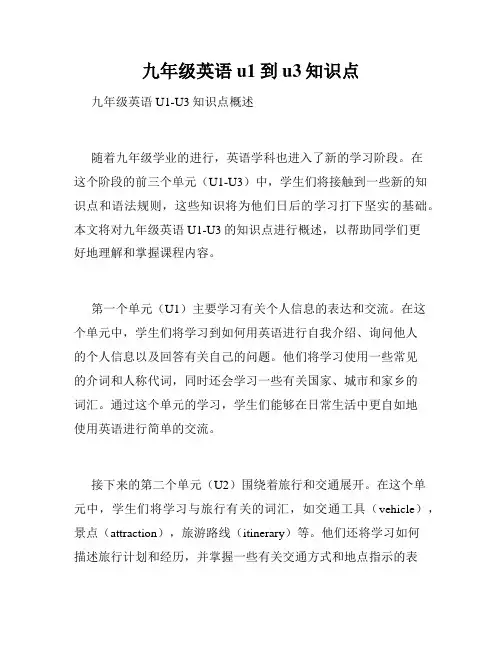
九年级英语u1到u3知识点九年级英语U1-U3知识点概述随着九年级学业的进行,英语学科也进入了新的学习阶段。
在这个阶段的前三个单元(U1-U3)中,学生们将接触到一些新的知识点和语法规则,这些知识将为他们日后的学习打下坚实的基础。
本文将对九年级英语U1-U3的知识点进行概述,以帮助同学们更好地理解和掌握课程内容。
第一个单元(U1)主要学习有关个人信息的表达和交流。
在这个单元中,学生们将学习到如何用英语进行自我介绍、询问他人的个人信息以及回答有关自己的问题。
他们将学习使用一些常见的介词和人称代词,同时还会学习一些有关国家、城市和家乡的词汇。
通过这个单元的学习,学生们能够在日常生活中更自如地使用英语进行简单的交流。
接下来的第二个单元(U2)围绕着旅行和交通展开。
在这个单元中,学生们将学习与旅行有关的词汇,如交通工具(vehicle),景点(attraction),旅游路线(itinerary)等。
他们还将学习如何描述旅行计划和经历,并掌握一些有关交通方式和地点指示的表达方式。
这个单元的学习将帮助学生们在未来的旅行中更加流利地与他人交流,并且能够更好地利用英语获取旅行信息和指导。
第三个单元(U3)侧重于学习与学校和学习有关的词汇和表达方式。
学生们将学习如何用英语描述他们的学校设施(facilities),教室(classroom),课程(curriculum)等,并能够询问他人的学校情况以及描述他们的学习经历。
此外,学生们还将学习一些有关学习方法和技巧的表达方式,提高他们在学习中的自我认识和学习能力。
除了以上三个单元中的具体知识点,这些单元还会涉及一些常见的英语语法和句型。
例如,在U1单元中,学生们将学习到一般现在时态的用法和一般过去时态的基本概念。
在U2单元中,他们将学习到一些描述位置和方向的介词用法,如in,on,at等。
在U3单元中,学生们将学习到一些基本的比较级和最高级的用法,以及how much和how many的区别。
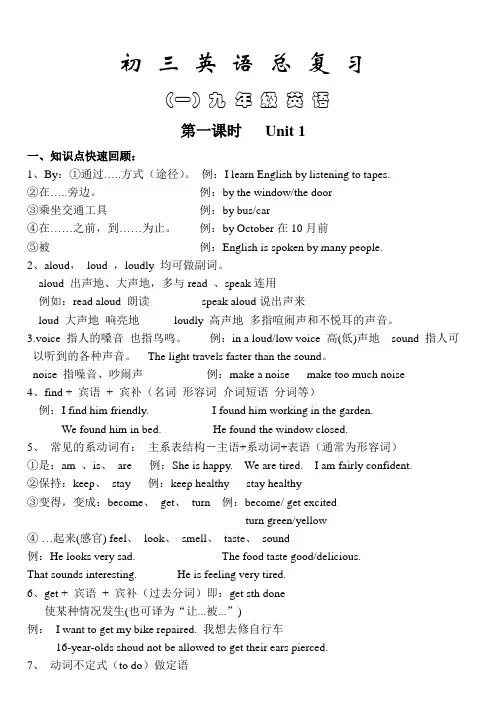
初三英语总复习(一)九年级英语第一课时Unit 1一、知识点快速回顾:1、By:①通过…..方式(途径)。
例:I learn English by listening to tapes.②在…..旁边。
例:by the window/the door③乘坐交通工具例:by bus/car④在……之前,到……为止。
例:by October在10月前⑤被例:English is spoken by many people.2、aloud,loud ,loudly 均可做副词。
aloud 出声地、大声地,多与read 、speak连用例如:read aloud 朗读speak aloud说出声来loud 大声地响亮地loudly 高声地多指喧闹声和不悦耳的声音。
3.voice 指人的嗓音也指鸟鸣。
例:in a loud/low voice 高(低)声地sound 指人可以听到的各种声音。
The light travels faster than the sound。
noise 指噪音、吵闹声例:make a noise make too much noise4、find + 宾语+ 宾补(名词形容词介词短语分词等)例:I find him friendly. I found him working in the garden.We found him in bed. He found the window closed.5、常见的系动词有:主系表结构-主语+系动词+表语(通常为形容词)①是:am 、is、are 例:She is happy. We are tired. I am fairly confident.②保持:keep、stay 例:keep healthy stay healthy③变得,变成:become、get、turn 例:become/ get excitedturn green/yellow④…起来(感官) feel、look、smell、taste、sound例:He looks very sad. The food taste good/delicious.That sounds interesting. He is feeling very tired.6、get + 宾语+ 宾补(过去分词)即:get sth done使某种情况发生(也可译为“让...被...”)例:I want to get my bike repaired. 我想去修自行车16-year-olds shoud not be allowed to get their ears pierced.7、动词不定式(to do)做定语①与所修饰的名词构成主谓关系The next train to arrive was from New York. He is always the first to come.②与所修饰的名词构成动宾关系I have nothing to say. I need a pen to write with.I need some paper to write on. I don’t have a room to live in.8、join 加入….成为其中一员例:Come and join us. Join the English clubtake part in指参加到某项活动中去。
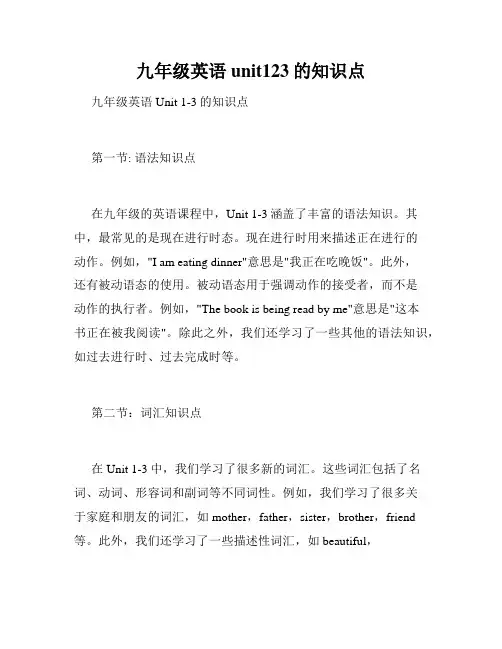
九年级英语unit123的知识点九年级英语Unit 1-3的知识点第一节: 语法知识点在九年级的英语课程中,Unit 1-3涵盖了丰富的语法知识。
其中,最常见的是现在进行时态。
现在进行时用来描述正在进行的动作。
例如,"I am eating dinner"意思是"我正在吃晚饭"。
此外,还有被动语态的使用。
被动语态用于强调动作的接受者,而不是动作的执行者。
例如,"The book is being read by me"意思是"这本书正在被我阅读"。
除此之外,我们还学习了一些其他的语法知识,如过去进行时、过去完成时等。
第二节:词汇知识点在Unit 1-3中,我们学习了很多新的词汇。
这些词汇包括了名词、动词、形容词和副词等不同词性。
例如,我们学习了很多关于家庭和朋友的词汇,如mother,father,sister,brother,friend 等。
此外,我们还学习了一些描述性词汇,如beautiful,interesting等。
通过学习这些词汇,我们能够更好地描述事物和人物。
第三节:阅读理解技巧阅读理解是英语学习中非常重要的一部分。
在Unit 1-3中,我们学会了一些有效的阅读理解技巧。
首先,我们要注重理解文章的主题句和段落大意。
通过抓住文章的重要信息,我们能够更好地理解文章的内容。
其次,我们要注意上下文的暗示和推测。
在阅读中,有时候我们需要通过上下文来推测一些词汇的意思。
最后,我们要善于使用词典和其他辅助工具来解决阅读中遇到的难点。
通过不断的阅读和练习,我们的阅读理解能力会不断提高。
第四节:听力技巧在九年级的英语学习中,我们还要提高我们的听力技巧。
在Unit 1-3中,我们学习了一些有关听力的技巧。
首先,我们要注意抓住关键词。
当我们听到关键词时,应该立即将其与自己已有的知识联系起来,以便更好地理解整个句子的含义。
第二,我们要注意上下文的线索。
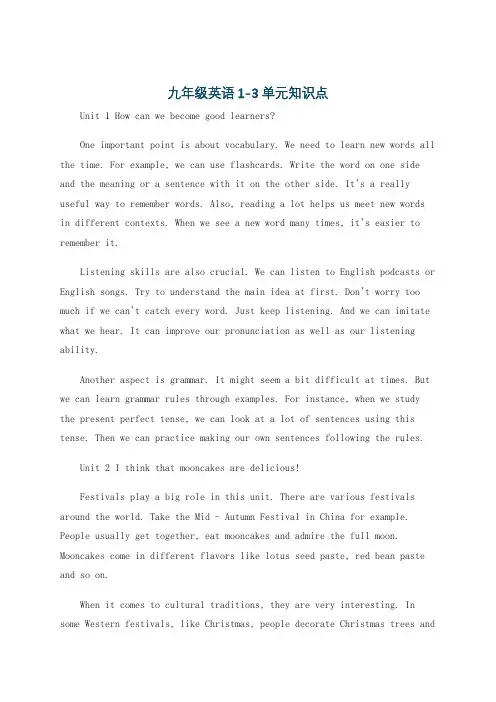
九年级英语1-3单元知识点Unit 1 How can we become good learners?One important point is about vocabulary. We need to learn new words all the time. For example, we can use flashcards. Write the word on one side and the meaning or a sentence with it on the other side. It's a really useful way to remember words. Also, reading a lot helps us meet new words in different contexts. When we see a new word many times, it's easier to remember it.Listening skills are also crucial. We can listen to English podcasts or English songs. Try to understand the main idea at first. Don't worry too much if we can't catch every word. Just keep listening. And we can imitate what we hear. It can improve our pronunciation as well as our listening ability.Another aspect is grammar. It might seem a bit difficult at times. But we can learn grammar rules through examples. For instance, when we study the present perfect tense, we can look at a lot of sentences using this tense. Then we can practice making our own sentences following the rules.Unit 2 I think that mooncakes are delicious!Festivals play a big role in this unit. There are various festivals around the world. Take the Mid - Autumn Festival in China for example. People usually get together, eat mooncakes and admire the full moon. Mooncakes come in different flavors like lotus seed paste, red bean paste and so on.When it comes to cultural traditions, they are very interesting. In some Western festivals, like Christmas, people decorate Christmas trees andgive presents to each other. These traditions have been passed down for a long time and they are important parts of the cultures.Talking about food in festivals is always fun. Different festivals have their own special foods. In the Dragon Boat Festival, we have zongzi. It's made of glutinous rice and often has fillings like meat or dates. These festival foods not only taste good but also carry cultural meanings.Unit 3 Could you please tell me where the restrooms are?Asking for directions is a key part. We need to use polite expressions. For example, “Could you please tell me...?” is much more polite than just “Where is...?” When we are in a new place and we want to find a placelike a restroom or a bookstore, we should use these polite ways to ask.There are different kinds of places we might need to find. Shopping malls usually have signs to show where different stores and facilities are. But in some old towns or small streets, we may have to ask local people. They can give us very useful information.We also need to understand some basic prepositions of place when asking for directions. For example, “next to”, “across from”,“between...and...”. If we know these well, it will be easier for us to understand the directions that others give us.。
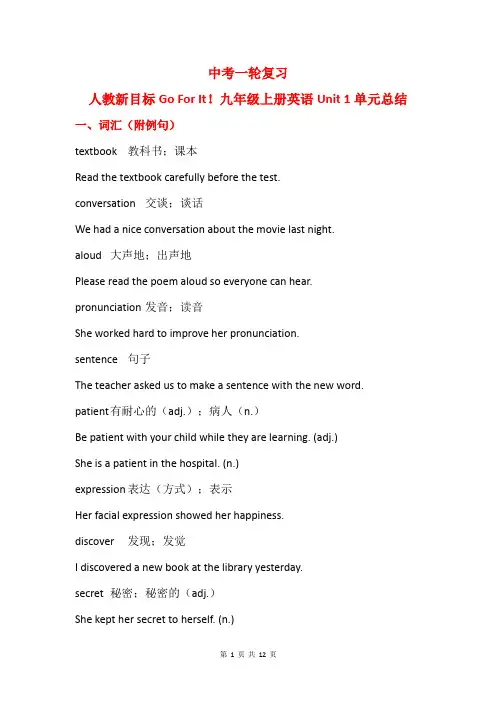
中考一轮复习人教新目标Go For It!九年级上册英语Unit 1单元总结一、词汇(附例句)textbook教科书;课本Read the textbook carefully before the test.conversation交谈;谈话We had a nice conversation about the movie last night.aloud大声地;出声地Please read the poem aloud so everyone can hear.pronunciation发音;读音She worked hard to improve her pronunciation.sentence句子The teacher asked us to make a sentence with the new word. patient有耐心的(adj.);病人(n.)Be patient with your child while they are learning. (adj.)She is a patient in the hospital. (n.)expression表达(方式);表示Her facial expression showed her happiness.discover发现;发觉I discovered a new book at the library yesterday.secret秘密;秘密的(adj.)She kept her secret to herself. (n.)This is a secret room in the house. (adj.)grammar语法I need to brush up on my grammar skills.repeat重复;重做Repeat the steps carefully to avoid mistakes.note笔记;记录(n.);注意;指出(v.)She took notes during the lecture. (n.)Please note that the deadline is next Friday. (v.)pal朋友;伙伴(非正式用语)My best pal and I have been friends since childhood.pattern模式;方式He found a pattern in the data that helped him solve the problem. physics物理学I enjoy studying physics because it's interesting.chemistry化学Chemistry is the study of matter and its interactions.partner搭档;同伴We worked on the project as partners.memorize记住;熟记Memorize these key points for the exam.increase增加;增长The population has increased significantly in recent years.speed速度(n.);加速(v.)She drove at a high speed on the highway. (n.)He sped up the car to pass the slow traffic. (v.)ability能力;才能She has a natural ability for music.brain大脑The brain is the control center of the body.active活跃的;积极的She is an active member of the school club.attention注意;关注Pay attention to the details of the problem.connect连接;与……有联系(v.);连接(n.)Connect the wires correctly to avoid sparks. (v.)The internet allows us to connect with people around the world. (n.) overnight一夜之间;在夜间The project was completed overnight by a team of experts.review回顾;复习She spent the evening reviewing her notes for the test. knowledge知识;学问She has a wealth of knowledge in ancient history.wisely明智地;聪明地He made a wise decision to invest in that company.二、短语知识(附例句)by making word cards 通过制作单词卡片释义:这是一种学习新单词的方法,通过制作卡片来加深记忆。
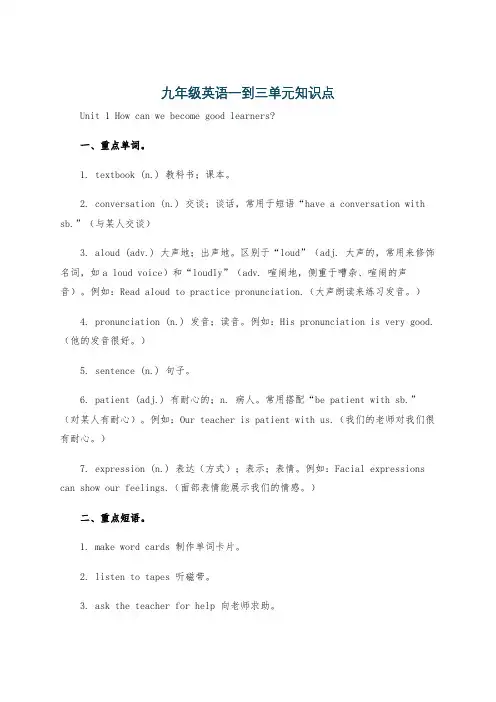
九年级英语一到三单元知识点Unit 1 How can we become good learners?一、重点单词。
1. textbook (n.) 教科书;课本。
2. conversation (n.) 交谈;谈话,常用于短语“have a conversation with sb.”(与某人交谈)3. aloud (adv.) 大声地;出声地。
区别于“loud”(adj. 大声的,常用来修饰名词,如a loud voice)和“loudly”(adv. 喧闹地,侧重于嘈杂、喧闹的声音)。
例如:Read aloud to practice pronunciation.(大声朗读来练习发音。
)4. pronunciation (n.) 发音;读音。
例如:His pronunciation is very good.(他的发音很好。
)5. sentence (n.) 句子。
6. patient (adj.) 有耐心的;n. 病人。
常用搭配“be patient with sb.”(对某人有耐心)。
例如:Our teacher is patient with us.(我们的老师对我们很有耐心。
)7. expression (n.) 表达(方式);表示;表情。
例如:Facial expressions can show our feelings.(面部表情能展示我们的情感。
)二、重点短语。
1. make word cards 制作单词卡片。
2. listen to tapes 听磁带。
3. ask the teacher for help 向老师求助。
4. read aloud 大声朗读。
5. have conversations with 与……交谈。
6. give a report 作报告。
7. word by word 逐字地。
8. the secret to... ……的秘诀。
例如:The secret to success is hard work.(成功的秘诀是努力工作。
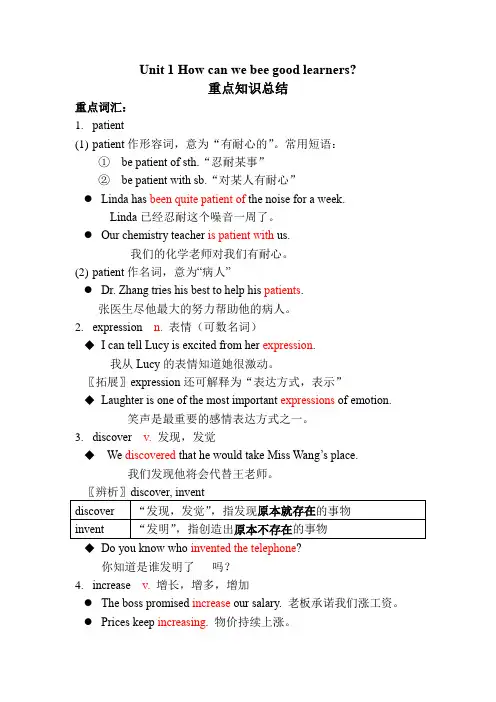
Unit 1 How can we bee good learners?重点知识总结重点词汇:1.patient(1)patient作形容词,意为“有耐心的”。
常用短语:①be patient of sth.“忍耐某事”②be patient with sb.“对某人有耐心”●Linda has been quite patient of the noise for a week.Linda已经忍耐这个噪音一周了。
●Our chemistry teacher is patient with us.我们的化学老师对我们有耐心。
(2)patient作名词,意为“病人”●Dr. Zhang tries his best to help his patients.张医生尽他最大的努力帮助他的病人。
2.expression n. 表情(可数名词)◆I can tell Lucy is excited from her expression.我从Lucy的表情知道她很激动。
〖拓展〗expression还可解释为“表达方式,表示”◆Laughter is one of the most important expressions of emotion.笑声是最重要的感情表达方式之一。
3.discover v. 发现,发觉◆We discovered that he would take Miss Wang’s place.我们发现他将会代替王老师。
◆Do you know who invented the telephone?你知道是谁发明了吗?4.increase v. 增长,增多,增加●The boss promised increase our salary. 老板承诺我们涨工资。
●Prices keep increasing. 物价持续上涨。
〖拓展〗increase还可作名词,意为“增长,增多,增加”●Unemployment is on the increase. 失业率在增长。
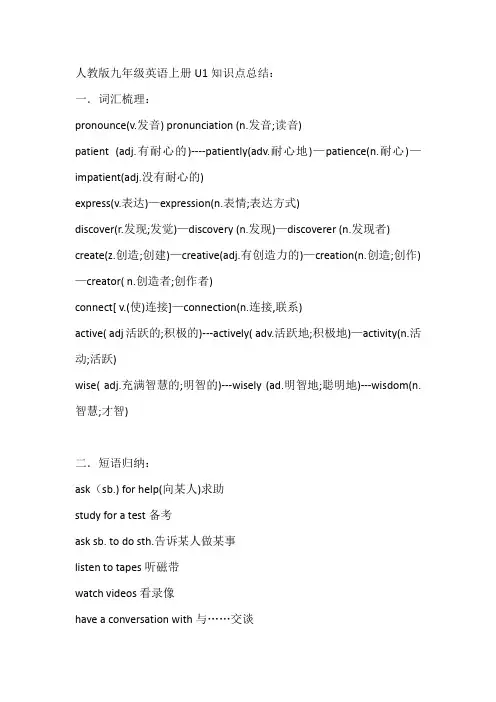
人教版九年级英语上册U1知识点总结:一.词汇梳理:pronounce(v.发音) pronunciation (n.发音;读音)patient (adj.有耐心的)----patiently(adv.耐心地)—patience(n.耐心)—impatient(adj.没有耐心的)express(v.表达)—expression(n.表情;表达方式)discover(r.发现;发觉)—discovery (n.发现)—discoverer (n.发现者) create(z.创造;创建)—creative(adj.有创造力的)—creation(n.创造;创作)—creator( n.创造者;创作者)connect[ v.(使)连接]—connection(n.连接,联系)active( adj活跃的;积极的)---actively( adv.活跃地;积极地)—activity(n.活动;活跃)wise( adj.充满智慧的;明智的)---wisely (ad.明智地;聪明地)---wisdom(n.智慧;才智)二.短语归纳:ask(sb.) for help(向某人)求助study for a test备考ask sb. to do sth.告诉某人做某事listen to tapes听磁带watch videos看录像have a conversation with与……交谈make word cards制作单词卡片read aloud 大声朗读word by word 逐字地,一字一字地give a report 作报告the secret to... ……的秘诀[bit by bit一点一点地take notes记笔记fall in love with爱上……look up(在词典、参考书中或通过电脑)查阅;抬头看make mistakes(make a mistake)犯错;出错be born with天生具有by mistake错误地;无意中depend on依靠;取决于mistake.. . for.. .把……错当成……have...in common在……方面有共同之处be interested in对……感兴趣pay attention to注意;关注learn from从……中学习write down写下;记录下look for寻找on one's own独自;单独;独立地instead of代替:而不是find out找出;查明over and over again多次;一再;反复地a little =a bit一点儿;稍微at first起初as well也connect.. .with...把…·…和…连接或联系起来write e-mails to给…写电子邮件keep a diary 记日记the ability to do sth.做某事的能力think about思考;考虑whether or not是否think of想起;考虑be good at = do well in擅长think over仔细考虑worry about 扣心even if = even though 即使;纵然;虽然三.用法总结:practice doing sth.练习做某事by doing sth.通过做某事keep doing sth.继续做某事,直做某事What about doing...?做....怎么样?finish doing sth.完某事the +比较级,the+ 比较级越....越..... 做find it +adj. + to do sth.发现做某事..... need to do sth.需要做某事r remember to do sth. 记得要做某事r be afraid of doing sth.害怕会发生某事remember doing sth. 记得做过某事[ be afraid to do sth.不敢做某事try to do sth.尽力做某事It's +adj. +to do sth.做某事...的。
英语九上1~3单元知识点
以下就是小编给大家盘点的英语九上1~3单元知识点,仅供大家参考。
以下是英语九年级上册1~3单元的知识点总结:
Unit1:How can we become good learners?一、重点短语:
ask for请求;询问
work with和......一起工作;同......合作
have conversations with和......交谈
by doing sth通过做某事
word by word逐字逐句地
二、重点语法:
①介词by的用法
②现在完成时的用法
Unit2:I think that mooncakes are delicious!
the Water Festival泼水节
the Dragon Boat Festival端午节
the Spring Festival春节
the Lantern Festival元宵节
eat out出去吃饭
二、重点语法:
①宾语从句的用法
②感叹句的用法
Unit3:Could you please tell me where the
restrooms are?
一、重点短语:
on your right在你的右边
turn left向左拐
between...and...在......和......之间pardon me对不起;请原谅
come on快点儿
①问路与指路的表达方式
②形容词的用法
以上这些只是一些重点知识点的总结,你可以根据自己的需求进行更详细的学习。
人教版九年级全一册英语Unit 1 知识点总结(含短语+句型+精讲+作文)Unit 1 How can we become good learners一、短语总结1.good learners 优秀的学习者2.work with friends 和朋友一起学习3.study for a test 备考4.have conversations with 与……交谈5.speaking skills 口语技巧6.a little 有点儿7.at first 起初起先8.the secret to .......的秘诀9.because of 因为10.as well 也11.look up (在词典中等)查阅;抬头看12.so that 以便,为了13.the meaning of ……的意思14.make mistakes 犯错误15.talk to 交谈16.depend on 依靠依赖17.have in common 有……共同之处18.pay attention to 注意关注19.connect ……with ……把……联系20.for example 例如21.think about 考虑22.even if 即使尽管23.look for 寻找24.worry about 担心担忧25.make word cards 制作单词卡片26.ask the teacher for help 向老师求助27.read aloud 大声读28.spoken English 英语口语29.give a report 作报告30.word by word 一字一字地31.so……that 如此……以至于32.fall in love with 爱上33.something interesting 有趣的事情34.take notes 记笔记35.how often 多久一次36.a lot of 许多37.the ability to do sth. 做某事的能力38.learning habits 学习习惯39.be interested in 对……感兴趣40.get bored 感到无聊41.be good at 在……方面擅长42.be afraid of 害怕43.each other 彼此互相44.instead of 代替而不是二、短语用法集萃1.by doing sth 通过做某事2.it +be+adj+to do sth 做某事是……的3.finish doing sth 完成某事4.what about doing sth?做某事怎么样?5.try to do sth 尽力做某事6.the +比较近,the+比较近越……,就越……7.find it+adj+to do sth 发现做某事8.be afraid of doing sth 害怕做某事9.help sb (to) do sth 帮助某人做某事10.practice doing sth 练习做某事11.keep doing sth 一直做某事12.be afraid to do sth 害怕做某事13.begin to do sth 开始做某事14.want (sb not ) to do sth 想要(某人不)做某事15.need to do sth 需要做某事16.remember to do sth 记得做某事17.shoot 射(射着,射死等表结果)18.shoot at射击三、词汇精讲1.finishfinish意为“完成,结束”,作及物动词时,其后可跟名词、代词或动名词。
人教版初三英语1~3单元知识点总结Unit 1 How can we ... learners?【重点短语】1. have conversation with sb. 同某人谈话2. too…to…太……而不能3. the secret to………的秘诀4. be afraid of doing sth./ be afraid to do sth. 害怕做某事5. look up 查阅6. repeat out loud 大声跟读7. make mistakes in 在……方面犯错误8. connect ……with…把……和……连接/联系起来9. get bored 感到厌烦10. be stressed out 焦虑不安的11. pay attention to 注意;关注12. depend on 取决于;依靠13. the ability to do sth.. 做某事的能力【考点详解】1. by + doing 通过……方式(by是介词,后面要跟动名词,也就是动词的ing 形式)2. talk about 谈论,议论,讨论The students often talk about movie after class. 学生们常常在课后讨论电影。
talk to sb= talk with sb 与某人说话3. 提建议的句子:①What/ how about +doing sth.? 做…怎么样?(about后面要用动词的ing 形式,这一点考试考的比较多)如:What/ How about going shopping?②Why don't you + do sth.? 你为什么不做…?如:Why don't you go shopping?③Why not + do sth. ? 为什么不做…?如:Why not go shopping?④Let's + do sth. 让我们做…...吧。
Unit 1 How can we become good learners?知识点全面背记清单-2022人教版英语九年级(词汇、短语、句型、语法、习作)一、教材词汇和用法1.textbook /tekstbuk/ n. 教科书This textbook contains 25 lessons. 这本教科书共有25课.I study English by reading the textbook.我通过读课本来学习英语。
2.conversation /kɔnvəs eɪʃn/, n. 交谈;谈话[常见短语] have a conversation with sb 与某人交谈 make a conversation 编对话;会话[学以致用] I improve my speaking skills by _____ ___ 我通过练习对话来提升口语技能。
[学以致用]If you find it _____to start a conversation, you can just say something about the weather.A. busyB. easyC. newD. hard3.aloud /əlaud/ adv. 大声地;出声地[辨析aloud & loudly & loud](1)aloud出声地;大声地。
常与read/ call等词连用, 不用于比较级。
(2)loud 大声地;喧闹地。
指说话声和笑声,常与talk/ speak/ laugh/ sing等词连用, 常用比较级。
(3)loudly 高声地;喧闹地。
可以和loud互换,含有“吵闹”的意思,不悦耳。
She played her records too loudly. 她播放唱片时音量太大了。
[学以致用]The music is too____, so I have to speak _____A. loud; loudB. aloud; loudC. loudly; loudlyD. loud; aloud[学以致用]I cant hear what you said clearly, so please speak in a____voice.A. louderB. more loudlyC. more aloudD. more loud[答案] A[详解]句意:我不能听清你说的话,所以请再大点声说。
九年级英语全册各单元知识点总结Unit1How can we become good learners一、短语:conversation with sb. 同某人谈话…with… 把…和…连接/联系起来secret to… ……的秘诀 afraid of doing sth./to do sth. 害怕做某事up 查阅 out loud 大声跟读~mistakes in 在……方面犯错误 bored 感到厌烦stressed out 焦虑不安的 attention to 注意;关注on 取决于;依靠 ability to do sth. 做某事的能力二、知识点:1. by + doing:通过……方式(by是介词,后面要跟动名词,也就是动词的ing形式);2. a lot:许多,常用于句末;3. aloud, loud与loudly的用法,三个词都与“大声”或“响亮”有关。
①aloud是副词,通常放在动词之后。
&②loud可作形容词或副词。
用作副词时,常与speak, talk, laugh等动词连用,多用于比较级,须放在动词之后。
③loudly是副词,与loud同义,有时两者可替换使用,可位于动词之前或之后。
4. not …at all:一点也不,根本不,not经常可以和助动词结合在一起,at all 则放在句尾;5. be / get excited about sth.:对…感到兴奋;6. end up doing sth:终止/结束做某事;end up with sth.:以…结束;7. first of all:首先(这个短语可用在作文中,使得文章有层次);8. make mistakes:犯错make a mistake 犯一个错误;9. laugh at sb.:笑话;取笑(某人)(常见短语))10. take notes:做笔记/记录;11. native speaker 说本国语的人;12. make up:组成、构成;13. deal with:处理、应付;14. perhaps = maybe:也许;15. go by:(时间)过去;other:彼此;… as … :把…看作为…;:… into…:将…变为…;19. with the help of sb. = with one's help 在某人的帮助下(注意介词of和with,容易出题)20. compare … to …:把…比作…compare with拿…和…作比较;21. instead:代替,用在句末,副词;instead of sth / doing sth:代替,而不是(这个地方考的较多的就是instead of doing sth,也就是说如果of后面跟动词时,要用动名词形式,也就是动词的ing形式)we/ I + do sth. 我们/我…好吗23. too…to:太…而不能,常用的句型是too+形容词/副词+ to do sth.Unit2I think that moon cakes are delicious!@一、短语:1. the Lantern Festival 元宵节2. the Dragon Boat Festival 端午节3. the Water Festival 泼水节4. remind sb. of 使某人想起5. eat five meals a day 一天吃五餐6. put on five pounds 体重增加了五磅7. treat sb. with. 用/以……对待某人8. be similar to... 与.......相似9. end up最终成为/处于10. share sth. with sb. 与……分享……11. as a result结果 12. one... the other... (两者中的)一个…另一个…<13. take sb. out for dinner 带某人出去吃饭 14. dress up 乔装打扮15. haunted house 鬼屋16. the beginning of new life 新生命的开始二、知识点:1.宾语从句:(三大考点:引导词、时态和语序。
九年级上册英语一至三单元知识点总结
一单元:
1.learn to use have to do sth,have got to do sth,have sth to do with
和have sth to do with 的用法。
2.掌握must,have to,should,could,might的用法。
3.学习现在完成时的结构以及动词形式。
4.学习掌握直接引语和间接引语的转换。
5.掌握情态动词的用法。
6.学会使用频度副词。
7.学会使用used to do sth和be used to doing sth的用法。
8.了解被动语态的基本用法。
二单元:
1.学习掌握动词不定式的用法。
2.了解There be句型以及其用法。
3.学习掌握祈使句的用法。
4.学习掌握表示建议和要求的句型。
5.学习使用情态动词。
6.了解表示转折的常用词语。
7.学会使用频度副词。
8.学会使用used to do sth和be used to doing sth的用法。
9.学习并掌握定语从句的基本概念和用法。
三单元:
1.学习掌握过去进行时的用法。
2.学习掌握过去完成时的用法。
3.学习掌握现在完成进行时的用法。
4.学习掌握现在完成时的被动语态用法。
5.学习掌握情态动词的完成式用法。
人教部编版初中九年级英语Unit 1-3 全部知识点总结Unit 1 How can we ... learners?【重点短语】1. have conversation with sb. 同某人谈话2. too…to…太……而不能3. the secret to………的秘诀4. be afraid of doing sth./ be afraid to do sth. 害怕做某事5. look up 查阅6. repeat out loud 大声跟读7. make mistakes in 在……方面犯错误8. connect ……with…把……和……连接/联系起来9. get bored 感到厌烦10. be stressed out 焦虑不安的11. pay attention to 注意;关注12. depend on 取决于;依靠13. the ability to do sth.. 做某事的能力【考点详解】1. by + doing 通过……方式(by是介词,后面要跟动名词,也就是动词的ing形式)2. talk about 谈论,议论,讨论The students often talk about movie after class. 学生们常常在课后讨论电影。
talk to sb= talk with sb 与某人说话3. 提建议的句子:①What/ how about +doing sth.? 做…怎么样?(about后面要用动词的ing形式,这一点考试考的比较多)如:What/ How about going shopping?②Why don't you + do sth.? 你为什么不做…?如:Why don't you go shopping?③Why not + do sth. ? 为什么不做…?如:Why not go shopping?④Let's + do sth. 让我们做…...吧。
如:Let's go shopping⑤Shall we/I + do sth.? 我们/我...…好吗?如:Shall we/I go shopping?4. a lot 许多,常用于句末。
如:I eat a lot. 我吃了许多。
5. too…to... 太…...而不能常用的句型:too+形容词/副词+ to do sth.如:I'm too tired to say anything. 我太累了,什么都不想说。
6. aloud, loud与loudly的用法,三个词都与“大声”或“响亮”有关。
①aloud是副词,通常放在动词之后。
②loud可作形容词或副词。
用作副词时,常与speak, talk, laugh等动词连用,多用于比较级,须放在动词之后。
如:She told us to speak a little louder. 她让我们说大声一点。
③loudly是副词,与loud同义,有时两者可替换使用,可位于动词之前或之后。
如:He does not talk loudly or laugh loudly in public. 他不当众大声谈笑。
7. not…at all 一点也不,根本不如:I like milk very much, but I don't like coffee atall. 我非常喜欢牛奶,但是我一点也不喜欢咖啡。
not经常可以和助动词结合在一起,at all 则放在句尾。
8. be/get excited about sth. 对…...感到兴奋9. ①end up doing sth 终止做某事,结束做某事如:The party ended up singing. 晚会以唱歌而结束。
②end up with sth. 以…结束(注意介词with)如:The party ended up with her singing. 晚会以她的歌唱而告终。
10. first of all 首先(这个短语可用在作文中,使得文章有层次)11. also 也、而且(用于肯定句)常在句子的中间either 也(用于否定句)常在句末too 也(用于肯定句)常在句末(它们三个的区分要清楚,尤其要知道用在什么句子中以及各自的位置)12. make mistakes 犯错如:I often make mistakes. 我经常犯错。
make a mistake 犯一个错误如:I have made a mistake. 我已经犯了一个错误。
13. laugh at sb. 笑话;取笑(某人)(常见短语)如:Don't laugh at me! 不要取笑我!14. take notes 做笔记,做记录15. enjoy doing sth . 喜欢做…,乐意做…(这是一个非常重要的考点)如:She enjoys playing football. 她喜欢踢足球。
enjoy oneself 过得愉快如:He enjoyed himself. 他过得愉快。
16. native speaker 说本族语的人17. make up 组成、构成18. one of +(the+ 形容词最高级)+名词复数形式: …其中之一(这一题主要考两点,一是最高级,一是名词复数,大家做题的时候要小心)如:She is one of the most popular teachers. 她是最受欢迎的教师之一。
19. It's +形容词+(for sb. )to do sth (对于某人来说)做某事…如:It's difficult (for me )to study English. 对于我来说学习英语太难了。
句中的it 是形式主语,真正的主语是to study English。
20. practice doing 练习做某事(practice后面接动名词,这一点有可能考到)如:She often practice speaking English. 她经常练习说英语。
21. decide to do sth. 决定做某事(重要考点,大家需要记住decide后面跟的是不定式,也就是to do)如:LiLei has decided to go to BeiJing . 李雷已经决定去北京。
22. unless 如果不,除非,引导条件状语从句如:You will fail unless you work hard. 假如你不努力你就会失败。
23. deal with 处理如:I dealt with a lot of problem.24. worry about sb./ sth. 担心某人/某事如:Mother worried about his son just now. 妈妈刚才担心他的儿子。
25. be angry with sb. 对某人生气26. perhaps = maybe 也许27. go by (时间)过去 .如:Two years went by. 两年过去了。
28. see sb / sth doing 看见某人正在做某事(如果是看到正在做什么,要用动词ing形式,考的较多的也是动词ing形式)如:She saw him drawing a picture in the classroom.她看见他正在教室里画画。
29. each other 彼此30. regard…as …;把…...看作为...…如:The boys regarded Anna as a fool. 这些男孩把安娜看成傻瓜。
31. too many 许多,修饰可数名词如:too many girlstoo much 许多,修饰不可数名词如:too much milk(要区分too many 和too much只要记住它们修饰什么词就可以了)much too 太,修饰形容词如:much too beautiful(too much和much too意思不同,大家不要混淆它们的意思,这种单词容易出解析题)32.change…into…将…变为…33. with the help of sb. = with one's help 在某人的帮助下(注意介词of和with,容易出题)如:with the help of LiLei = with LiLei's help 在李雷的帮助下34. compare…to…把…比作...(另外,大家要注意另一个短语,compare...with...,这也是一个重要的短语,意思是:拿…和…比较)35. instead 代替用在句末,副词instead of sth/doing sth 代替,而不是(这个地方考的较多的就是instead of doing sth,也是就说如果of后面跟动词,要用动名词形式,也就是动词的ing形式)如:I will go instead of you. 我将代替你去。
2Unit 2 I think that ... delicious!【短语归纳】1. the Lantern Festival 元宵节2. the Dragon Boat Festival 端午节3. the Water Festival 泼水节4. be fun to watch 看着很有意思5. eat five meals a day 一天吃五餐6. put on five pounds 体重增加了五磅7. in two weeks 两星期之后8. be similar to... 与.......相似9. end up最终成为;最后处于10. share sth. with sb. 与……分享……11. as a result 结果12. dress up 乔装打扮13. haunted house 鬼屋14. call out 大声呼喊15. remind sb. of 使某人想起16. sound like 听起来像17. treat sb. with. 用/以……对待某人18. the beginning of new life 新生命的开始【考点详解】1. What + a(n) + 形容词+ 可数名词的单数形式+主语+谓语+其他)!多么……的……!2. How + 形容词/副词(+主语+谓语+其他)!……多么……!3. be going to 将要/打算……4. in + 时间段在……后5. give sb. sth.=give sth. to sb. 给某人某物;把某物给某人6. plan to do sth. 计划做某事7. refuse to do sth. 拒绝做某事8. one of + 名词复数形式……之一【重点语法】一、宾语从句宾语从句在复合句中作主句的宾语。